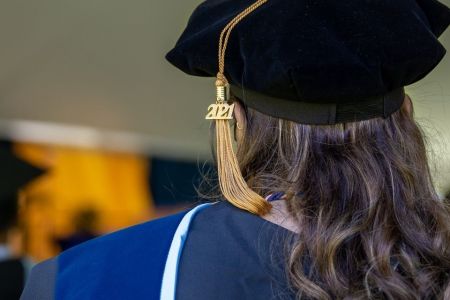Practicum & Internship Placements
- Inpatient/outpatient clinics & hospitals
- School counseling centers
- Private practice settings
- Forensic-related placements

With a doctorate of psychology (PsyD) and a master of education (MEd) in human sexuality studies, you'll gain the experience and expertise necessary for an innovative career in a broad range of clinical settings.
Dual Degree (PsyD & MEd)
196
5 Years
In our dual degree doctorate of psychology and master of education (PsyD/MEd) program, you'll hone skills to thrive as a scholarship-practitioner-psychologist who empowers diverse people and groups around issues related to sexuality.
This program combines live (synchronous) and independent (asynchronous) coursework to provide flexibility to students working full time. Starting Fall 2025, all courses will be offered 100% online.
You'll spend five years in-person studying, training, and creating a dissertation to earn your doctorate of psychology. As you gain hands-on, faculty-supervised practical experience in clinical psychology, you'll also train in the unique settings and situations that surround human sexuality study with both in-person and online classes and experiences.
Through a practicum placement, paid internship rotations, and rigorous dissertation research, you'll graduate prepared to teach, consult, conduct research, and provide assessment and intervention on issues of sexuality to help others thrive.

The doctoral degree in clinical psychology program and exclusively-affiliated internship are accredited by the Commission on Accreditation of the American Psychological Association (750 1st Street, NE, Washington, DC 20002, 202-336-5979).
The clinical psychology/education in human sexuality program is a partnership between the Center for Human Sexuality Studies and the Institute for Graduate Clinical Psychology.
You'll spend five years taking in-person classes towards your PsyD at the Institute for Graduate Clinical Psychology. Simultaneously, through the addition of summer courses, field experiences, and electives during the academic year, you'll also earn your MEd in human sexuality studies.
Along with these requirements, you'll also participate in a number of noncredit learning experiences, like workshops and minicourses, designed to help you integrate your training and develop unique skills.
Note: Some students may be required to take courses beyond the five years, depending on other aspects of their psychology curriculum.
View the Loading... for course requirements and information. For more information on PsyD certificate tracks and concentrations, visit the PsyD program page.
At Widener, a unique clinical and internship experience is embedded in the PsyD degree curriculum.
Year 1: Pre-Practicum
The pre-practicum training is multi-modal and experiential. It offers you opportunities to learn and practice skills that are foundational to the practice of professional psychology.
Years 2–3: Practicum Training
The practicum-level placements are designed to familiarize you with a variety of clinical settings. Each practicum offers progressively more responsibility and patient–staff interaction.
Years 4 & 5: Internship Training Program with three day a week clinical rotations
Most doctoral students in clinical psychology enter the Association for Psychology Postdoctoral and Internship Centers (APPIC) match process to find a pre-doctoral internship. In contrast, our PsyD program offers a unique and fully integrated internship that is accredited by the Commission on Accreditation of the American Psychological Association (750 First Street NE, Washington, DC 20002, 202-336-5979).
This means that rather than enter the APPIC match to find an internship; our students are guaranteed a local internship placement through our in-house network of outstanding internship rotations.
The clinical psychology doctoral degree program is designed to afford an opportunity for doctoral level nonclinical psychologists to shift their career focus to the professional practice of clinical psychology. Students must have a PhD in psychology from an accredited university. The respecialization is typically 3 years of study, including the internship.
Doctoral education alone is not sufficient for licensure in the United States. In addition to requiring specific educational criteria, all states require candidates for licensure to pass a national exam after completing graduate education (the Examination for Professional Practice in Psychology [EPPP]), and many states also require additional experiences for licensure, including supervised post-doctoral experiences, criminal history background checks, and personal ethical/moral references. Specific requirements for each state vary, and are developed and monitored by State Boards of Psychology. A general list of State Boards and contacts can be found on the website of the Association of State and Provincial Psychology Boards.
The curriculum provided by Widener’s Institute for Graduate Clinical Psychology meets state educational requirements for licensure as listed below. It is strongly recommended that students who expect to pursue licensing in a particular state reach out to the licensing board to confirm specific licensing requirements. The information below is accurate, as best as could be determined based on published records of state licensing requirements, as of June 2021.
Our curriculum puts you on the right track to meeting the requirements for certification by the American Association of Sexuality Educators, Counselors, and Therapists (AASECT).
Widener University is an AASECT-approved continuing education provider for human sexuality studies. Earning certification from AASECT is an essential milestone in your professional journey, validating that you have met rigorous training and experiential requirements. AASECT provides certification for sexuality educators, sexuality counselors, sex therapists, and supervisors. For healthcare and human service professionals, certification is widely recognized as a fundamental prerequisite for practice.
Employment of marriage and family therapists, including sex therapists, is expected to increase by 14% by 2031, much faster than the average for all occupations, according to the U.S. Bureau of Labor Statistics' Employment Projections.

You’ll hit the ground running. In your first year, you’ll dive into clinical training that includes courses on theory and technique, laboratory activities to practice basic skills, and discussion groups to process the nuances and challenges of clinical work. Practicum placements continue the intensive clinical training through the third year of the program. All students are also admitted to our APA-accredited internship at the time of doctoral program admission, which translates to a placement in our exclusively-affiliated and integrated internship in years four and five.
From the Interdisciplinary Sexuality Research Collaborative (ISRC) to our many on-campus clinics & centers, real-world application and service will always be at the heart of your education.

Here, you'll find welcoming faculty mentors committed to equity, inclusion, diversity, and social justice. Our faculty are highly-skilled practitioners and educators who can be found influencing policy, conducting de-stigmatizing sexuality research, and performing at our latest drag brunch. They're passionate about your personal success and provide mentorship, feedback, and support during your studies and even after graduation.
In addition to fostering relationships with faculty mentors, you'll build bonds with driven classmates and accomplished alumni by attending events, joining discussions, and participating in various clubs and organizations, including Gamma Eta Rho - A National Honor Society in Human Sexuality, Human Sexuality Education Student Organization, and more.
On the list of Editors' Choice 50 Best Accredited PsyD Programs for 2022
"My approach to teaching is best described as embracing an existentialist and social reconstructivist perspective, emphasizing respect for what each student brings to the classroom and students’ responsibility for their own learning. In my teaching at Widener, these methods have resulted in positive outcomes as measured by student course evaluations and verbal feedback."
The clinical training and supervision that you're most likely to receive here could be invaluable to your development as a clinician. The partnerships that you could make in the tri-state area and beyond would be lifelong, diverse, and in line with your future areas of focus or expertise.

After trying final semesters during COVID-19, alumni from the Institute for Graduate Clinical Psychology offer their support for students through sponsoring doctoral hoods for each graduate.
Our admissions and financial aid teams are here to support you every step of the way. Have a question? Ask away!
Applicants to the joint degree program must be admitted by both the Institute for Graduate Clinical Psychology and the Master of Education in Human Sexuality program. Requirements for admission into the joint program parallel requirements for the Doctor of Psychology. Matriculation into the joint program is allowable only at the time of admittance.
For the PsyD/MEd interdisciplinary program, applicants need to apply through the PsyCAS website. Follow the prompts for the dual degree carefully, and include a copy of your most current resume. Students are interviewed and admitted individually by each program.
Please visit the Clinical Psychology (PsyD) program page for more information about requirements specific to the clinical psychology doctoral degree.
The online application opens September 8.
An online application, including all supporting credentials, must be received by 11:59 pm EST, December 9 to be considered for admittance into the program. We encourage all applicants to submit their application as early as possible, especially as applications are only complete once verified by PSYCAS. All admittance decisions are made by April 1.
Widener transfer applicants follow the same application process as general applicants. After you apply, our admissions team will work with you to determine whether completed undergraduate and graduate coursework will count towards foundation/core courses that can be waived or substituted.
Up to one course may be waived per semester towards Widener's PsyD program. To be eligible, the waived course must be replaced with another elective. Waived courses do not count as advanced standing because the PsyD program does not offer advanced standing and is a five-year program.
Widener University serves as a "second home" for students from around the world. We are located just outside of Philadelphia and close to New York City and Washington, D.C.—offering many unique professional and personal opportunities to explore.
Want to know what it's like to be an international student on campus or need assistance navigating English proficiency requirements? We're here to help, and our international admissions director will support you through the application process. This support doesn't end with admissions—our International Student Support team will serve as a valuable resource throughout your Widener journey—meeting Visa/immigration requirements, getting acclimated to campus, and much more.
Learn more about applying as an international student
Learn more about life at Widener as an international student
Because Widener is a private institution, we're able to offer financial assistance that brings our education within reach for individuals who might otherwise not be able to afford it.
You might be surprised how much we are able to offer.
Getting started is easy. Simply apply to Widener and submit your FAFSA to be automatically considered for scholarships and grants. "FAFSA" stands for the Free Application for Federal Student Aid and helps identify whether you are eligible for aid awarded by Widener, the government, and other sources. Our school code is 003313.
In order to receive a financial aid offer, students must meet certain eligibility requirements. Here are the general eligibility requirements for most financial aid programs:
Learn more about applying for financial aid as a graduate student
Simply apply to Widener and complete the financial aid process to be automatically considered for scholarships and grants. Because Widener is a private institution, we are able to offer financial assistance that brings our education within reach for individuals who might otherwise not be able to afford it. You might be surprised at how much we are able to offer in assistance.
In order to receive your part of the financial aid pie, all you have to do is submit your FAFSA. "FAFSA" stands for the Free Application for Federal Student Aid and helps identify whether you are eligible for aid awarded by Widener, the government, and other sources.
Widener offers a limited number of graduate assistantships to enrolled students. GAs receive tuition assistance for their work. Once you're a student, contact your program director for more information.
A limited number of university-based scholarships are made available to enrolled graduate students made possible directly from our academic department or thanks to the generosity of university donors. No extra steps are needed to be taken prior to admission. Once enrolled, contact your program director to learn more.
Widener University also partners with many local organizations and corporations to offer discounted tuition and other incentives to their employees. Don't see your company on the list? Ask them to become a partner. In addition, employers often offer educational reimbursement benefits. We encourage you to explore these opportunities and will be glad to provide any necessary documentation.
If you graduated with a degree from Widener, you may qualify for a 20% tuition discount. The first step to see what you qualify for is to submit your application. Widener offers students many paths to savings, and while we don't offer "double discounts", we'll make sure you'll get the biggest financial benefit you're eligible for. Only students who have completed an associate's, bachelor's, master's, or doctoral degree are eligible. Students who have pursued a 4+1, 4+2, or 3+3 pathway, graduate assistantship, Widener-funded scholarship, or other tuition discount may not be eligible if the financial discount granted surpasses 20%.
| Psychology (Full-Time Doctoral) | Per Semester | Annual |
| Psychology - First Year | $21,852 | $43,704 |
| Psychology - Fall 2025 Cohort | $20,610 | $41,220 |
| Psychology - Fall 2024 Cohort | $19,932.50 | $39,865 |
| Psychology - Fall 2023 Cohort | $19,352 | $38,704 |
| Psychology - Fall 2022 Cohort | $18,697.50 | $37,395 |
| PSY D Joint Program Fee (MBA, MCJ, HSED) | (no semester fee) | $1,028 |
Tuition rates are subject to change. Official costs for your first year will be determined at time of enrollment.
To visit Widener is, often, to fall in love with the place. To fit your timeline and schedule, we offer a variety of ways to get to know us.
We offer a variety of virtual events to get to know Widener and meet with faculty and admissions staff.
Have a question about Widener? Drop us a line and an admissions counselor will be in touch. We're always happy to help!
All applications and supplemental materials are submitted through a centralized application service (CAS) system.
Hyatt Hall
14th St
Chester, PA 19013
501 E. 13th Street
Room 104
